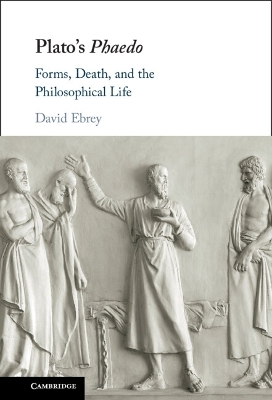
Plato's Phaedo
Cambridge University Press (Verlag)
978-1-108-47994-3 (ISBN)
Plato's Phaedo is a literary gem that develops many of his most famous ideas. David Ebrey's careful reinterpretation argues that the many debates about the dialogue cannot be resolved so long as we consider its passages in relative isolation from one another, separated from their intellectual background. His book shows how Plato responds to his literary, religious, scientific, and philosophical context, and argues that we can only understand the dialogue's central ideas and arguments in light of its overall structure. This approach yields new interpretations of the dialogue's key ideas, including the nature and existence of 'Platonic' forms, the existence of the soul after death, the method of hypothesis, and the contemplative ethical ideal. Moreover, this comprehensive approach shows how the characters play an integral role in the Phaedo's development and how its literary structure complements Socrates' views while making its own distinctive contribution to the dialogue's drama and ideas.
David Ebrey is co-editor (with Richard Kraut) of the Cambridge Companion to Plato (2022), editor of Theory and Practice in Aristotle's Natural Science (2015), and the author of articles on a variety of topics in Plato and Aristotle.
1. The Characters; 2. The Phaedo as an Alternative to Tragedy and Socrates as a Poet: 57a–61c; 3. Defense of the Desire to be Dead: 61c–69e; 4. Cebes' Challenge and the Cyclical Argument: 69e–72d; 5. The Recollecting Argument: 72e–77d; 6. The Kinship Argument: 77d–80d; 7. The Return to the Defense: 80d–84b; 8. Misology and the Soul as a Harmonia: 84c–86e, 88c–95a; 9. Socrates' Autobiography: 95e–102a; 10. Cebes' Objection and the Final Argument: 86e–88b, 102b–107b; 11. The Cosmos and the Afterlife: 107c–115a; 12. The Death Scene: 115a–118a.
| Erscheinungsdatum | 30.01.2023 |
|---|---|
| Zusatzinfo | Worked examples or Exercises |
| Verlagsort | Cambridge |
| Sprache | englisch |
| Maße | 154 x 235 mm |
| Gewicht | 700 g |
| Themenwelt | Geisteswissenschaften ► Philosophie ► Ethik |
| Geisteswissenschaften ► Philosophie ► Philosophie Altertum / Antike | |
| Geisteswissenschaften ► Religion / Theologie | |
| ISBN-10 | 1-108-47994-4 / 1108479944 |
| ISBN-13 | 978-1-108-47994-3 / 9781108479943 |
| Zustand | Neuware |
| Informationen gemäß Produktsicherheitsverordnung (GPSR) | |
| Haben Sie eine Frage zum Produkt? |
aus dem Bereich


